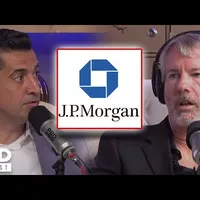Why Storing Money In Banks Is a Mistake (2)
The average guy's not a billionaire.
The only thing they know what to do is walk up to the bank.
So it's a different scenario.
But the question I want to ask you is the following.
Are you saying there's going to be bigger banks that are on the line right now that
we could see popping up that they're in the same situation?
Because if most of them are doing it, Powell's not lowering rates.
And they're saying he's not going to do it till December.
So how much longer can these guys handle these types of conditions?
Yeah.
So let me just answer two questions.
What do I think will happen to the banking system?
And what do I think a person should do?
What I think happens to the banking system is all of the regional banks, the small, mid-sized
banks are at a massive disadvantage right now because the government is showing that
they're not going to bail out those equity holders.
So there's a migration of deposits from the small banks to the big banks.
I think the JP Morgan's, the Bank of America's, the mega banks will continue.
They'll be just fine.
They'll be supported by the government.
The small banks are going to struggle.
And that's what you see going on right now.
If you're a depositor, I mean, you'll probably get bailed out by the government.
If you're a bond holder in the bank or an equity holder at the bank, you won't get
bailed out, right?
And so there's a crisis for investors, whereas everybody that's a depositor doesn't want
to sit around and take the risk, right?
I mean, who wants any anxiety?
So I think that to the extent that you rely on banks, clearly the world is waking up and
the U.S. is waking up, and they're thinking, I want to be with big banks.
I wouldn't have my money in a bank anywhere outside the U.S. in a weak country, right?
You need to be in a rich, strong country with a rich, strong bank.
With regard to what individuals should do, I think the logical answer is for expenses,
if you have expenses in the next three months, you have your expenses in the local currency,
which is the peso, the naira, the whatever, because it's legally obligated for you to
pay in the local currency.
For the next three years of expenses or one to three years of expenses, you put your wealth
in the strongest world currency in the world.
That's the dollar right now.
But you make sure that you have that currency either self-custodied or you have it in a
bank that you trust.
That's hard.
If you can't find a bank, if you were in Lebanon right now...
Can we trust you, Ben?
If you're in Lebanon right now, you wouldn't put your money in any bank.
You would actually put it on the Bitcoin blockchain.
For any amount of money you want to keep the rest of your life, if you want to give it
to your kids, if you want to actually retire on it, anything that's an investable asset,
you would put it in Bitcoin.
You would put it in the strongest possible world currency, the global money, and that's
Bitcoin.
You're not going to get rich investing in dollars, and you'll lose all your money if
your dollars are in a weak bank, and if your dollar's in a strong bank, you'll just get
poor slowly.
And you're going to get poor rapidly if your money is in not the dollar but a weaker currency,
and you're going to get completely bankrupt if you trust a weak bank.
And so MicroStrategy, by the way, has...
We had like 90 million dollars.
We had four plus billion dollars worth of Bitcoin.
So go figure, right?
Ninety-eight percent of our assets are actually in the strong money.
Two percent is in the world's strongest currency in a good bank, in one of the big four banks.
Right?
And that's about as much exposure as I want to a currency.

